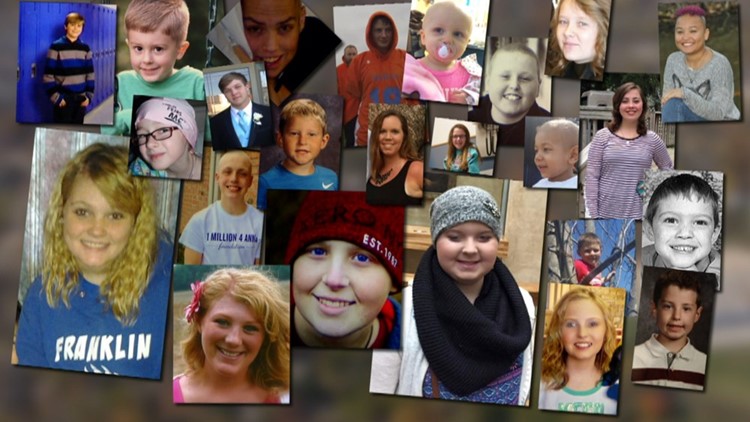A group of Johnson County mothers who watched their kids fight cancer, are now joining forces to help push for change in Congress.
13 Investigates first told you about rates above the state and national averages in Johnson County last November. Those stories have now inspired an Indiana connection to a proposed federal law, aimed at coordinating efforts to investigate pediatric cancer across the country.
The effort comes months after Johnson County lost another child to cancer.
Jagger Passwater died in November on his third birthday, just six months after he was diagnosed with Neuroblastoma, a rare childhood cancer. But Jagger's diagnosis and death won't be officially counted as part of Indiana cancer rates until next year.
Gaps in the state registry
13 Investigates uncovered a gap in cancer reporting last November, showing how spikes in the state's pediatric cancer rates could go undetected for years.
The State Department of Health says its cancer registry lags behind two years and that there's not enough pediatric cancer research or data to determine possible environmental causes or a cancer cluster.
"We have a lot of work to do," admitted Indiana Deputy Health Commissioner Jennifer Walthall, moments before she addressed a forum of frustrated parents. Walthall said she was speaking as a mother and a doctor.
13 Investigates discovered almost 30 children were diagnosed with cancer in Johnson County between 2009 and 2015. Nearly half of them lived or had close ties to the city of Franklin and a neighborhood near a contaminated well field that most residents knew nothing about.
"We have nothing and that's what they kept telling us in the forum," recalled Stacie Davidson, the mother who first raised concerns to WTHR about childhood cancer in Johnson County. "What is the magic number to where the State of Indiana will say, 'Okay, we need to investigate?'"
It's not the first time families of children suffering from cancer posed that question. In fact, there's a push for more coordinated data tracking and investigative guidelines for pediatric cancer in Washington D.C.
New proposed federal legislation
It's called "Trevor's Law."
"I was diagnosed with brain cancer at the age of 13," said Trevor Schaefer as he introduced himself to a Senate Environmental Committee in 2011.
He's come a long way since then.
Trevor is one of five kids diagnosed with pediatric cancers in his small Idaho community of McCall 13 years ago.
Requests for an investigation at that time into what was making kids sick there, went nowhere.
In 2011, Idaho Senator Mike Crapo invited Trevor to talk to that congressional committee in Washington D.C. about the proposed legislation that sprouted from his own personal story.
Trevor's Law seeks to develop consistent criteria to monitor, track, and respond to instances of potential cancer clusters nationwide. It would create a mechanism to study and document where cancer outbreaks occur, their possible causes, and those impacted. It would also improve communication and data sharing between local, state and federal governments.
"Some people are told that their small populations render them statistically insignificant," Trevor said, explaining the frustration families endure trying to get answers from state health agencies.
At his side was nationally reknown environmentalist Erin Brockovich.
"The system for investigating, responding, and reporting these concerns is inadequate," Brockovich told the panel.
"The cancer registries have gaps in many states," testified Dr. Gina Solomon during that 2011 congressional hearing, citing one of the same issues raised last year by 13 Investigates.
Despite the firepower and warnings, Trevor's Law stalled for nearly three years.
Historic vote includes Trevor's Law
Then last December, the Senate made a historical vote to pass an all encompassing chemical reform act.
"We'll finally be able to protect our kids from toxic chemicals," said Senator Tom Udall (D-New Mexico), as he spoke on the Senate floor about the enormity of the bill.
All 100 Senators, including Indiana Senators Dan Coats, a Republican, and Joe Donnelly, a Democrat, voted in favor of the Frank R. Lautenberg Chemical Safety Act for the 21st Century. It would regulate how companies use and discard cancer causing toxins and provide more protections for the consuming public.
It's the first environmental update in 40 years to the nation's Toxic Substances Control Act and the reform bill included Trevor's Law.
"A lot of this was grassroots, people standing up and saying, 'We haven't done what we need to do, for the American people, for our families for our children," explained Udall.
13 Investigates shared the news with two mothers who have watched their kids and many others fight cancer. Stacie Davidson and Patty Meade are leading the charge for answers in Johnson County. Meade was stunned to hear that the entire Senate embraced the bill.
"It's unheard of," she said with tears welling up in her eyes.
And there was something else the two moms didn't expect to hear.
Indiana moms invited to join fight in Congress
Trevor Schaefer saw their stories with 13 Investigates and asked them to come aboard to help push the bill in the House of Representatives.
"You really, really want answers and you're very passionate about that, and that's what it takes to make change in this country. And that was very inspiring to me," Trevor said, speaking to the women for the first time from Boise, via Facetime.
"I'm so excited," Davidson responded. "I never thought that it would get to this level."
"We're ready to jump on board," said Meade.
"We all want the same thing, the exact same thing. (I'm) sick of seeing so many families suffer from this," said Trevor, now 26.
Indiana Congressman vows to support legislation
13 Investigates reached out to Indiana's congressional delegation. So far, at least one Indiana congressman is ready to vote yes.
"Trevor's law attempts to develop an oversight apparatus that will hold local officials accountable and federal officials accountable," said Rep. Andre Carson (D-Indiana). "Coming from a family that has a history of dealing with cancer, it's near and dear to my heart. It's something I want to champion."
The proposed federal law honors Trevor's childhood cancer fight and is now calling for change for hundreds of other kids just like him in Johnson County and nationwide.
"It's huge," said Meade wiping away tears as she stared at the proposed legislation.
"Finally," added Davidson with a hint of relief in her voice.
"Somebody to listen. Somebody to actually hear what we have to say and not just brush us under the rug and make excuses for what is happening," said Meade, seeming to finish up both of their thoughts in one final statement.
Negotiations are now underway in the House of Representatives.
Sen. Donnelly, a co-sponsor of the reform of the act, told13 Investigates in a statement that "as a parent, I can understand the value of having as much information as possible about potential connections between our health, the chemicals we use and the environment."
The inclusion of Trevor's Law, Donnelly said, will increase state and federal coordination, raise awareness and provide more information to concerned families.



